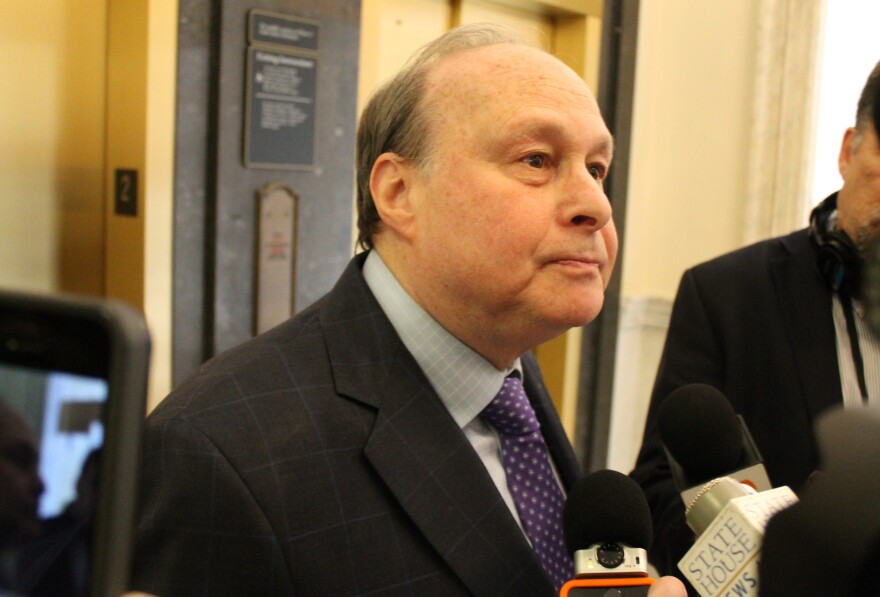President Donald Trump and Vice President Joe Biden meet this week for their first debate. And we’re just a week away from the only scheduled U.S. Senate debate in Massachusetts between incumbent Democrat Ed Markey and Republican challenger Kevin O'Connor.
O'Connor pushed for seven debates — the same number Markey had with Kennedy in the Democratic primary contest. But so far, Markey has agreed to just one hour-long debate.
Matt Murphy of the State House News Service joins us to talk about the week ahead in state government and politics — starting off with the backdrop to Markey's debate decision.
Matt Murphy, State House News Service: If you talk to the Markey campaign, they point to a number of factors, including the length of time between the primary and the general election.
The seven debates in the primary against U.S. Rep. Joe Kennedy took place from — you know, since that campaign started in late 2019, all the way through to September.
September to November is a much shorter time period. The senator has business to attend to in Washington, they say.
And they believe that unlike in the primary, where you had these two well-known figures trying to differentiate themselves, Markey's team thinks that you're going to see all you need to see in this one hour, to know what separates Senator Ed Markey from Republican Kevin O'Connor. And that's why they've agreed to only one.
Carrie Healy, NEPM: The trustees for the Holyoke Soldiers' Home meet Wednesday for a special meeting. A judge last week overturned the Baker administration's firing of Superintendent Bennett Walsh, who led the home at the start of a COVID-19 outbreak there, and 76 veterans died from the disease. The judge said only the trustees could fire Walsh, not the governor. But a few days later, Walsh was indicted on felony charges. What message do you see Attorney General Maura Healey sending with these criminal charges?

She is certainly sending a very strong message that what happened at Holyoke was, you know, in her opinion, criminal.
These charges stem from the decisions made by the superintendent, as well as the medical director of the facility, to cohabitate people that had COVID-19 — or were asymptomatic but still positive — with other healthier residents, with dementia, in a single unit. That decision led to these charges.
This meeting coming up on Wednesday was already going to be interesting. The governor's firing of Bennett Walsh was overturned by the courts. When asked, the governor basically said, "I hope, now, that the board does the right thing," in his opinion, and fires Walsh on their own.
This takes on a new layer with the charges brought by Healey. There are potential legal ramifications here.
It will be interesting to see how they proceed, or if they just simply keep him on leave while these criminal charges are pending, and what flexibility they have there, in terms of Bennett Walsh's legal rights while this criminal case plays out.
You interviewed former Massachusetts Senate President Stan Rosenberg of Amherst, who left the state legislature in no small cloud of scandal more than two years ago. He's now a lobbyist. Anything about that interview surprise you?

When we approached the former Senate president to talk with us — it's now been, like you said, two years since he left Beacon Hill, and not in the way he once saw himself leaving after a 30-year career there.
He did not want to talk about the scandal involving his husband at the time, and the circumstances around his departure.
But he is stepping back into the public sphere a bit. He has finally registered as a lobbyist, something he laughed and said he never envisioned himself doing.
He's lobbying for some marijuana cannabis cultivator clients that are setting up some retail and manufacturing businesses out in western and central Massachusetts.
He is also doing some work around advanced manufacturing, trying to set up a lab in Amherst near the campus of UMass, to try and bring new developments in manufacturing into Massachusetts that would create jobs. So, some interesting stuff there.
One thing I did find interesting — with him being a bit reflective of his time on Beacon Hill — as we were talking about the Supreme Court vacancy following the death of Ruth Bader Ginsburg, he said one of his regrets was the vote he took to change the way Senate vacancies are filled in Massachusetts.
This was done twice: when John Kerry looked like he might become president, and again when Senator Ted Kennedy died. They changed the rules based on the party affiliation of the governor at the time. He said that was a mistake — that these rules should not be changed for partisan purposes.







